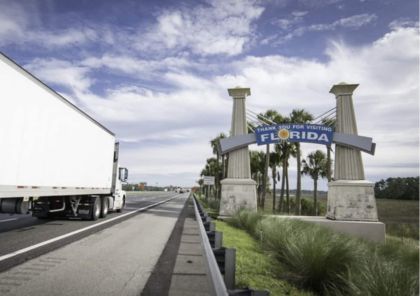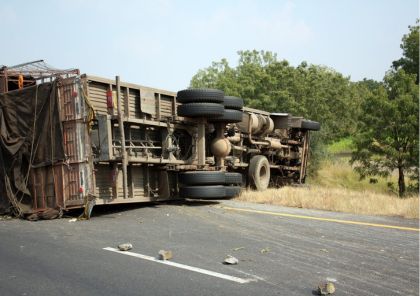
The Top 10 Nuclear Verdicts in Trucking Cases
No time to read the post? You can follow us on our podcast channel and learn more about how to be a successful Owner Operator and Company Driver.
What Are Nuclear Verdicts?
In the legal realm, a nuclear verdict refers to a jury award that far exceeds typical settlements—often reaching tens or even hundreds of millions of dollars. These decisions are usually made in cases where the judge or court allows punitive damages to punish gross negligence, reckless behavior, or systemic failures in safety. In many instances, such verdicts have been rendered in Florida verdict cases or in jurisdictions known for being particularly sympathetic to plaintiffs. Whether it’s due to driver fatigue, distracted driving, or poor vehicle maintenance, the outcomes have sent shockwaves through the industry.
The Top 10 Nuclear Verdicts in Trucking
Below, we’ll walk through ten of the most notorious cases, discussing the circumstances, legal arguments, and eventual resolutions:
1. $1 Billion Verdict – Kahkashan Transportation & AJD (Florida, 2021)
In a landmark decision in Florida, a jury delivered a record-setting $1 billion verdict following the wrongful death of 18-year-old Connor Dzion. The case involved two companies: one where an unlicensed trucker was on his cell phone and driving past legal hours, and another where a truck on cruise control crashed into a line of stopped cars. Juries assigned 90% fault to one company and 10% to the other, awarding significant punitive damages. The verdict, which was meant to hold the companies accountable for systemic safety failures, has since sparked a debate about the true collectability of such enormous awards—especially when one of the defendants was already defunct. For more details on this case, check out Baker Sterchi’s analysis.
2. $462 Million Verdict – Wabash National (Missouri, 2024)
Another staggering verdict came when a Missouri jury awarded $462 million to families of two young victims killed in an underride crash. The truck’s rear guard tore off upon impact, allowing a car to slide underneath. The legal arguments centered on product liability and negligence, accusing Wabash National of prioritizing profit over safety by skimping on essential upgrades. To learn more about the details, visit KSDK’s coverage.
3. $411 Million Verdict – Top Auto Express (Florida, 2020)
In another Florida case, Top Auto Express—an owner operator with a single truck—faced a $411 million verdict after a catastrophic 45-vehicle pileup. The verdict was rendered against a small carrier that rejected a settlement offer, ultimately highlighting how juries in plaintiff-friendly jurisdictions can impose nuclear verdicts even when the actual assets of the company may not support such a large award. For an in-depth look at this case, see Land Line Media’s report.


4. $281.6 Million Verdict – “Drive Shaft” Case (Texas, 2012)
A mechanical failure near San Antonio led to a $281.6 million verdict when a truck’s drive shaft detached and fatally injured a driver. The case centered on negligent maintenance and became a benchmark example of how courts may punish corporate negligence—even when the trucker himself was not directly at fault. This case, later reduced judicially, underscored the importance of maintenance protocols in the industry. More information is available from Atlanta Injury Law Blog.
5. $280 Million Verdict – Schnitzer Southeast (Georgia, 2019)
A tragic accident in Georgia resulted in a $280 million verdict against Schnitzer Southeast. The case involved a trucker who fell asleep at the wheel, causing a head-on collision that took multiple lives. The verdict, which was reached in less than an hour of deliberation, highlighted the issues of driver fatigue and the responsibilities of even large, well-resourced companies to enforce strict safety measures. Read more at Biz Journals.
6. $90 Million Verdict – Werner Enterprises (Texas, 2018)
In a high-profile Texas case, a Werner Enterprises truck collided with a pickup during icy conditions, resulting in a $90 million verdict. The verdict was based on evidence that the company’s policies and training were grossly deficient—issues that could have been mitigated with better oversight. This case has been cited as an example of how even large carriers are not immune from nuclear verdicts when safety lapses occur. For more details, check out The Trial Lawyers’ report.
7. $100+ Million Verdict (Reduced) – FTS International (Texas, 2018)
An initially nine-figure verdict against FTS International for a relatively minor accident turned into a legal rollercoaster. The case involved a trucker allegedly under the influence and resulted in a verdict exceeding $100 million—later reduced significantly on appeal. This case demonstrates how nuclear verdicts, even when headline-grabbing, are subject to appellate review and adjustment. For further insights, visit Land Line Media.
8. $70 Million Verdict – Werner Enterprises (Texas, 2017)
Werner Enterprises made a second appearance on this list with a separate case in which a trucker under the influence rear-ended a passenger vehicle, leading to a $70 million verdict. This decision again underscored the industry’s zero tolerance for impaired driving and the severe financial implications even for large, well-established companies. More on this case can be found on Infiniti Workforce.
9. $58.5 Million Verdict – JHOC, Inc. (California, 2018)
In California, a case involving a fatigued or possibly impaired trucker who lost control led to a $58.5 million verdict against JHOC, Inc. The loss of life in a collision with a stopped vehicle—where a mother and her two children perished—evoked strong jury sympathy, and the award reflected both compensatory and punitive damages. For more details, check out Infiniti Workforce’s coverage.
10. $54 Million Verdict – J.B. Hunt Transport (2018)
Finally, even industry giants like J.B. Hunt Transport are not immune. In a case involving driver fatigue and potential vehicle maintenance issues, a jury awarded $54 million for a highway crash that resulted in severe, life-altering injuries. This verdict highlights how even well-insured, large carriers can face massive liabilities when their safety protocols fail. You can read more at Infiniti Workforce.
Key Comparisons and Insights
When you look at these cases side by side, several trends emerge:
Severity of Driver Misconduct: Whether it’s texting while driving, fatigue, or even drug use, nearly every case involves an element of driver misconduct. This factor is pivotal in driving juries to award punitive damages. In many instances, the evidence not only pointed to individual negligence but also to systemic failures within the company.
Corporate Responsibility and Safety Culture: Many verdicts highlight not just the behavior of a single trucker but also broader issues such as poor training, lack of proper maintenance, and overall corporate indifference to safety. In cases like the drive shaft failure or the underride crash, the companies were penalized for neglecting safety upgrades that could have prevented the accident.
Impact on Small Carriers vs. Large Fleets: While large carriers like J.B. Hunt and Werner Enterprises have the resources to manage such large awards (through appeals or increased insurance), smaller carriers—sometimes owner operators—are particularly vulnerable. A nuclear verdict against a small carrier can be financially devastating, leading to bankruptcy or forcing them out of business.
Judicial Oversight and Appeals: Not every nuclear verdict remains as high as initially awarded. Several cases, such as the FTS International and drive shaft cases, saw their awards reduced upon appeal. This indicates that while juries may be willing to hand down enormous sums to send a message, appellate courts sometimes step in to recalibrate the damage awards.
Final Thoughts
When you look at these cases side by side, several trends emerge:
As we’ve seen, the top 10 nuclear verdicts in trucking cases provide a window into an industry under pressure from both legal and public scrutiny. Whether it’s a Florida verdict awarding billions or a punitive measure against a small owner operator, these cases underscore a simple message: safety cannot be compromised. For truckers, carriers, and even the courts, the stakes are high, and the need for robust safety protocols is more urgent than ever.
The ongoing debate over nuclear verdicts—and their potential reform—remains a critical conversation for everyone involved in trucking and transportation. In the meantime, the industry continues to evolve, learning from past mistakes to build a safer future on our highways. If you’re interested in more detailed analyses and case studies, I encourage you to explore resources like FleetOwner and Samba Safety for deeper dives into these landmark cases.
Ultimately, these verdicts serve as a wake-up call for the entire industry. For truckers, whether a seasoned professional or a new owner operator, the lessons are clear: maintain rigorous standards, never cut corners on safety, and remember that the court’s eye is always watching.
Frequently Asked Questions
1. What is a "nuclear verdict" as discussed in the context of trucking cases?
2. Why are nuclear verdicts a significant concern for the trucking industry?
Financial Instability: They can lead to bankruptcy or severe financial distress for trucking companies, even large ones.
Increased Insurance Costs: A rise in nuclear verdicts contributes to soaring insurance premiums for the entire industry, making it harder for carriers to obtain affordable coverage.
Reputational Damage: Beyond the financial cost, such verdicts can severely damage a company's reputation.
Operational Changes: They can force companies to re-evaluate and overhaul their safety practices, hiring processes, and operational protocols.
Industry-Wide Impact: The trend can affect freight costs and potentially lead to a contraction in the availability of trucking services if carriers are forced out of business.
3. What are some common factors or alleged failures that contribute to nuclear verdicts in trucking cases?
Driver-Related Issues:
Driver fatigue or hours-of-service violations.
Distracted driving (e.g., cell phone use).
Speeding or reckless driving.
Driver error or inexperience.
Impairment (though not always the primary factor in the top verdicts listed, it's a general concern).
Inadequate driver training or qualification.
Company Negligence & Oversight:
Negligent hiring, retention, or supervision of drivers (e.g., hiring drivers with poor records).
Failure to enforce safety policies and federal regulations.
Inadequate vehicle maintenance and inspection.
Pressure on drivers to violate rules to meet schedules.
Lack of, or failure to use, safety technologies.
Attempts to cover up or downplay negligence post-accident.
Severity of Incident:
Catastrophic injuries (e.g., brain damage, paralysis) and fatalities.
4. What are the typical consequences for a trucking company that receives a nuclear verdict?
The company may be forced to pay the verdict if their insurance coverage is insufficient.
It can lead to significant legal fees and protracted appeals processes.
Insurance carriers may drop the company or drastically increase premiums, making future operations difficult.
The company might face increased scrutiny from regulatory bodies.
In extreme cases, it can lead to the company ceasing operations.
5. What does the article illustrate about the monetary sums involved in these top nuclear verdicts?
6. Are there specific types of negligence repeatedly highlighted in the cases leading to these verdicts?
Systemic Safety Lapses: Not just isolated incidents, but ongoing failures in safety management.
Ignoring Red Flags: Such as drivers with multiple prior violations or known issues like fatigue.
Failure to Adhere to Federal Motor Carrier Safety Regulations (FMCSRs): Violations of these safety rules are often central to plaintiff arguments.
7. What can trucking companies, including owner operators and smaller carriers, learn from the issues highlighted in these nuclear verdict cases?
Prioritize Safety Culture: Safety must be a core value, not just a compliance item.
Rigorous Driver Management: Implement thorough hiring, training, and ongoing monitoring of drivers.
Strict Adherence to Regulations: Ensure full compliance with FMCSRs, especially regarding hours of service and vehicle maintenance.
Invest in Safety Technology: Utilize available technologies like electronic logging devices (ELDs), dashcams, and collision avoidance systems.
Maintain Meticulous Records: Proper documentation of training, maintenance, and safety compliance is vital.
Adequate Insurance: While it may not cover the entirety of a "nuclear" sum, having robust insurance is critical.
Proactive Risk Management: Regularly assess and mitigate potential safety risks within the operation.